Professor Graham Wallas of the University of London, who with Professor Shorey of the University of Chicago will deliver this June the third series of the Dartmouth alumni lectures has announced the general subject of his lectures as "Towards an Art of Political Thought." The subjects of the individual lectures as announced by Professor Wallas are:
"The Need of More effective Thought," "Relation Between Thought and the Nervous System," "Logic and 'Scientific Method'," "The Pedagogy of the Thought Process," "Thought and Feeling in Education," "Intellectual Freedom," "Special Difficulties of Political Thought," and "Voting as an Expression of Thought."
In the first lecture Professor Wallas will take up what he calls "the present danger to civilization, the limitation of our ability to create thoughts by direct effort," and accounts given by successful thinkers of their methods. The second lecture takes up the relation between feeling and thought, feeling as the judge of thought, as the precursor of thought and as the stimulus of thought; feeling and impulse; poets and the revelation of significance; habit and originality; thought and the conduct of life; the problem of unification; mysticism, auto-suggestion, and other forms of control of the subconscious. "The relation of preceding analysis to the practical art of adult thought," and "certain American problems" will be considered in the third lecture while public education and variations in natural ability, self-consciousness in education, and leisure and discipline are the topics of the fourth lecture. The fifth lecture will deal with thought and character and accounts given by graduate students of efforts towards original thoughts. Under the head of "Intellectual Freedom," the subject of the sixth lecture, the danger of separation between the teaching of thought, or of any other art, and the practice of it will be discussed. The relation between the invention of institutions and the invention of types of conduct is considered in the seventh lecture. The final lecture includes a study of the political party as an [expression of thought, the politician and the administrator, and the special relation between possible changes in ideals of intellectual conduct and the working of modern political and economic institutions.
 View Full Issue
View Full Issue
More From This Issue
-
 Article
ArticleTHE ANNUAL MEETING OF THE SECRETARIES, APRIL 27 AND 28
June 1923 By E. M. STEVENS '01, J. W. WORTHEN '09, C. E. SNOW '121 more ... -
 Sports
SportsBASEBALL
June 1923 -
 Article
ArticleAs the Commencement season draws near,
June 1923 -
 Class Notes
Class NotesCLASS OF 1911
June 1923 By Nathaniel G. Burleigh -
 Class Notes
Class NotesCLASS OF 1911
June 1923 By Nathaniel G. Burleigh -
 Article
ArticleTHE COLLEGE AND THE RIVER
June 1923 By JOHN KING LORD '68
Article
-
 Article
ArticleTOWN TO SPEND $12,000 ON IMPROVEMENT FOR BRIDGE
NOVEMBER, 1926 -
 Article
ArticleAlumni Articles
January 1961 -
 Article
ArticleThe College
June 1975 -
 Article
ArticleGive a Rouse for
MAY 1984 -
 Article
ArticleThe Voice of Dartmouth
October 1993 By Dean Engle '92 -
 Article
ArticlePROPAGANDA AND THE CRISIS
May 1947 By MICHAEL E. CHOUKAS '27

